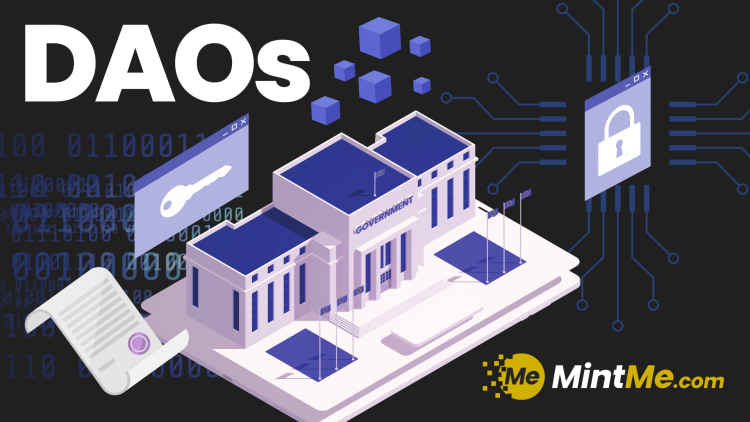Mintme News

The rise of autonomous organizations (DAOs) is one of the most exciting developments in the blockchain and AI space. DAOs are decentralized, self-governing entities that operate on a blockchain network, where decisions are made through a consensus mechanism. The emergence of DAOs is a game-changer for governance, enabling stakeholders to participate in decision-making and creating a more transparent and democratic system.
DAOs are enabled by blockchain technology, which allows for the creation of decentralized applications (dApps) that operate without the need for a central authority. This means that decision-making is distributed across a network of nodes, and no single entity has control over the system. DAOs use smart contracts, which are self-executing agreements that run on a blockchain, to automate decision-making and eliminate the need for intermediaries.
The use of AI in DAOs is still in its early stages, but it has the potential to revolutionize the way these organizations operate. AI can be used to analyze data and make predictions, which can inform decision-making within DAOs. Machine learning algorithms can also be used to optimize the performance of DAOs, by identifying inefficiencies and suggesting improvements.
One of the most significant benefits of DAOs is that they are more democratic than traditional organizations. In a DAO, every stakeholder has a say in decision-making, and there is no central authority that can override the consensus of the network. This creates a more transparent and fair system, where decisions are made based on the will of the majority.
Another advantage of DAOs is that they can operate more efficiently than traditional organizations, as they are not burdened by the bureaucracy and inefficiencies that are typically associated with centralized systems. DAOs can also be more resilient to external threats, as they do not have a single point of failure that can be targeted by attackers.
The rise of DAOs has significant implications for governance, particularly in areas such as finance and investment. DAOs can be used to create decentralized investment funds, where investors can pool their resources and make investment decisions collectively. This creates a more democratic system, where smaller investors have the same say as larger investors, and decisions are made based on the collective wisdom of the network.
DAOs can also be used to create decentralized autonomous organizations (DAOs) that operate in a similar way to traditional companies, but without the need for a central authority. These organizations can be used to create decentralized platforms for the sharing economy, where users can exchange goods and services without the need for intermediaries.
However, there are also challenges associated with the rise of DAOs. One of the most significant challenges is the issue of governance, particularly around the distribution of decision-making power within the network. DAOs are still in their infancy, and there is a need for clear governance frameworks to be established to ensure that decision-making is fair and transparent.
Another challenge is the issue of scalability, as blockchain networks can currently only process a limited number of transactions per second. This means that there is a limit tothe number of stakeholders that can participate in a DAO, and there is a need for scaling solutions to be developed to enable DAOs to operate on a larger scale.
There are also concerns around the use of AI in DAOs, particularly around the potential for AI to be used to manipulate decision-making. Critics argue that AI could be used to influence the consensus mechanism, or that it could be used to create a centralized decision-making system within the network.
Despite these challenges, the rise of DAOs is a significant development in the blockchain and AI space. DAOs have the potential to create a more democratic and transparent system of governance, and to enable stakeholders to participate in decision-making on a more equal footing. The use of AI in DAOs also has the potential to unlock new levels of efficiency and optimization, and to create more resilient and adaptable organizations.
As the technology behind DAOs and AI continues to evolve, it is likely that we will see the emergence of new use cases and applications. It is also likely that we will see new challenges and obstacles emerge, as the technology is tested in real-world environments. However, it is clear that the rise of DAOs and AI is a significant development that has the potential to transform the way we think about governance and decision-making.
Isaac Vitales